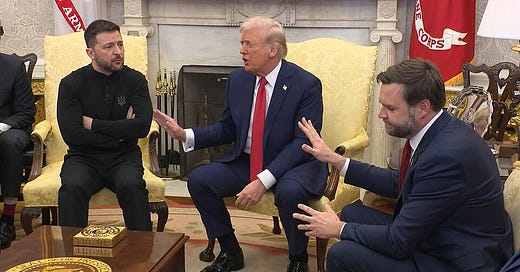Now that a few months have passed and the hot takes have cooled, it’s worth taking a sober look back at the now-infamous February 28 meeting at the White House between Ukrainian President Volodymyr Zelensky, President Donald Trump, and Vice President J.D. Vance. It was meant to demonstrate strategic dialogue by showcasing an agreement on mineral rights, one that would serve as an example of a pragmatic and non-emotional approach to foreign policy. Instead, it turned into a cringeworthy spectacle that reflected poorly on all involved.
Let’s be honest: none of them behaved well. In an era that treats every disagreement as a binary clash between heroes and villains, this may come as a surprise. But the reality here is a bit more complicated than what partisans would have you believe— no one came out of the Oval Office looking good.
Nonetheless, predictably, the partisan spin machines revved into overdrive. The left portrayed Zelensky as the defiant leader of the free world, bravely staring down the ignorant forces of isolationism and pro-Putin fascism. Meanwhile, the right proclaimed that Trump and Vance had boldly stood up to an ungrateful foreign leech who insulted the American people.
Both narratives miss the point. This was not a heroic moment for either side. It was more like a badly staged reality TV episode, complete with inflated egos, performative outrage, and no adults in the room.
Let’s start with Zelensky. All he really needed to do was show up, put on a suit, be gracious, and remember that he was asking for help — not delivering an ultimatum. But three years of Western adulation appear to have gone to his head. He’s grown comfortable with the idea that he is not merely Ukraine’s president but the protagonist in an existential struggle to defend Western democracy. It’s as if he believes he’s still acting in a TV show.
That delusion does not serve his country well. Diplomacy requires humility, especially when your nation’s survival depends on the goodwill of others. Zelensky forgot that when you’re the one asking for something, it’s best to be deferential, even if it means remaining silent in the face of falsehoods. Unfortunately, he did not seem to be particularly interested in rising to the moment.
That said, Trump and Vance didn’t cover themselves in glory either. Their reaction to Zelensky’s stubbornness was hardly the cool, disciplined response of seasoned statesmen. It was petty and theatrical. Trump, ever the showman, treated the moment like an episode of The Apprentice: World Leaders Edition. He relished the tension instead of diffusing it. Vance, meanwhile, couldn’t resist delivering a public scolding that was as unnecessary as it was self-congratulatory. As the meeting concluded, he looked more like a giddy schoolboy who had just witnessed a fun cafeteria fight than a vice president managing serious geopolitical tensions. He could barely contain the look of amusement at the blow-up.
But there was nothing great—or amusing—about this debacle. The idea that we would throw away a potentially beneficial strategic partnership over a disagreement about semantics is ludicrous.
And let’s be clear: Zelensky’s now-infamous remark about America feeling pain was not, as some have claimed, a veiled threat. It was an unpolished — perhaps undiplomatic — way of stating something fundamentally true: when the American-led global order is challenged by aggressors like Russia, American interests suffer. Instability abroad doesn’t stay abroad. It ripples outward. That doesn’t mean we must engage in endless wars or open-ended commitments, but pretending that Russia cannot affect our national security or level of prosperity is delusional. They don’t need to invade the homeland to do that.
This meeting should have been an opportunity to hash out disagreements behind closed doors like professionals. Instead, it became a stage for posturing on all sides. Zelensky either misjudged his leverage or lost his composure—or both. Perhaps this had something to do with the absurd and counterproductive advice he had received from congressional Democrats shortly before the White House spat. Regardless, in the end, both determined that winning an argument in front of cameras was more important than achieving substantive results.





